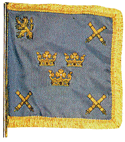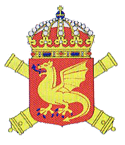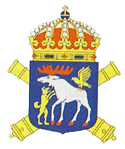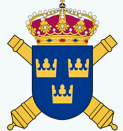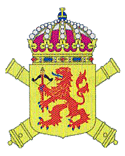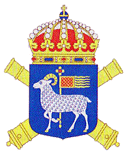

Copyright © Hans Högman 2019-05-20
Swedish Regiments during
the days of the Allotment
System - Artillery
Artillery Regiments
3. Swedish Regiments -
Artillery

From the 16th century, the artillery was called
"arkliet" and later "artilleriet" (artillery). In 1655 all of
the artillery in the piece organization was transferred
into one regiment, The Artillery Regiment. This
regiment formed 8 companies.
At the end of the Swedish - Danish war of 1675 -
1679 the field artillery was reorganized by King Karl
XI. Instead of two large companies, the field artillery
now formed 4 very mobile companies of only 60
men each.
The soldiers in the artillery were enlisted, not
allotted.
In 1689 the field artillery was reorganized into one
regiment, The Artillery Regiment.
In 1794 the Artillery Regiment was divided into four
independent regiments:
1.
The Svea Artillery Regiment
2.
The Göta Artillery Regiment
3.
The Wendes Artillery Regiment
4.
The Finnish Artillery Regiment
The Svea Artillery Regiment, A1
Swedish name: Svea
artilleriregemente.
Names: 1689 Artillery Regiment, 1794 Svea Artillery
Regiment, 1892 First Svea Artillery Regiment, 1904
Svea Artillery Regiment, 1946 motorized.
Location of the primary Garrison of the
Regiment: Stockholm, 1877 Valhallavägen 17, 1949
Rissne, 1963 Linköping.
Training camp: Ladugårdsgärde, from 1882 Marma,
1915 Järva, 1963 Hästholmen.
Image: Svea Artillery Regiment’s heraldic escutcheon.
The Göta Artillery Regiment, A2
Swedish name: Göta artilleriregemente.
Names: 1689 Artillery Regiment, 1794
Göta Artillery Regiment, 1892 First
Göta Artillery Regiment, 1904 Göta
Artillery Regiment, 1951 motorized,
1962 disbanded.
Location of the primary Garrison
of the Regiment: Göteborg, 1866
Kaserntorget 11, 1895 Kvibergsvägen. Training
camp: 1821 Dösebacken, Kungälv, 1862 Tångahed,
Vårgårda, 1884 Tångehed-Remmene
Image: Göta Artillery Regiment’s colors.
The Wendes Artillery Regiment, A3
Swedish name: Wendes artilleriregemente.
Names: 1689 Artillery Regiment, 1794
Wendes Artillery Regiment. 1892 one
company was mounted, 1830 all
companies mounted, until 1927 one
mounted division, 1943 motorized.
Around 1914, the A3 was probably the
largest artillery regiment in the world
with 14 batteries of four pieces each.
Location of the primary Garrison of the
Regiment: 1794 Kristianstad, Kaserngatan 1-5, 1814
also Västra Storgatan 51, between 1750's and 1879
also Landskrona.
Training camp: 1794 Beckhovet, 1795 Näsby fält,
1900 Rinkaby.
Image: Wendes Artillery Regiment’s heraldic
escutcheon..
The Norrland Artillery Regiment, A4
Swedish name: Norrlands artilleriregemente.
The regiment was formed in 1893 when two
batteries from the Svea Artillery
Regiment and two from the Göta
Artillery Regiment were merged
creating the Norrland Artillery
Regiment. In 1910, the 3rd Division
of the A4 was moved to Boden,
where it formed the Norrbotten
Artillery Corps in 1928.
Location of the primary Garrison of the
Regiment: 1893 Östersund, Regementsgatan 25 -
27.
Training camp:
Image: Norrland Artillery Regiment’s heraldic
escutcheon..
The Uppland Artillery Regiment, A5
Swedish name: Upplands artilleriregemente.
The regiment was formed in 1894 by merging two
batteries from the Svea Artillery
Regiment and two from the Wendes
Artillery Regiment, creating the
Second Svea Artillery Regiment. In
1904, the regiment changed its name
to Uppland Artillery Regiment. 1927
disbanded.
Location of the primary Garrison of the
Regiment: 1894 Stockholm, 1901 Uppsala, Dag
Hammarskjöldsväg 10 - 18.
Training camp:
Image: Uppland Artillery Regiment’s heraldic
escutcheon.
The Småland Artillery Regiment, A6
Swedish name: Smålands artilleriregemente.
The regiment was formed in 1895 by merging two
batteries from Göta Artillery Regiment and one from
Wendes Artillery Regiment, creating
the Second Göta Artillery
Regiment. In 1901, the Karlsborg
Artillery Corps was added to the
regiment. In 1905, the regiment
changed its name to Småland
Artillery Regiment. During the years
1928 - 1942, the regiment was named Småland Army
Artillery Regiment. From 1942, back to Smålands
Artillery Regiment. In 1985, it was disbanded.
Location of the primary Garrison of the
Regiment: 1894 Stockholm, 1895 Göteborg, 1898
Jönköping, Kompanigatan 6.
Training camp: 1896 Tångahed, 1898 Skillingaryd.
Image: Småland Artillery Regiment’s heraldic
escutcheon..
The Gotland Artillery Regiment, A7
Swedish name: Gotlands artilleriregemente.
Established in 1811 as Gotland
National Conscription Artillery, A4. In
1861, Gotland National Conscription
Artillery Corps, in 1887 Gotland
Artillery Corps, in 1892 new unit
designation, A7. 1934 motorized,
1975 Gotland Artillery Regiment.
Location of the primary Garrison
of the Regiment: Visby.
Training camp: 1888 Martebo myr, 1898 Tofta.
Image: Gotland Artillery Regiment’s heraldic
escutcheon..
The Vaxholm Artillery Corps, A8
Swedish name: Vaxholms artillerikår.
Established in 1889 as Vaxholm Artillery Corps, A5.
1892 Vaxholm Artillery Corps, A8. In 1902, the corps
was transferred to the Coast Artillery, with the unit
designation KA1.
Vaxholm Artillery Corps has its origins in the
company from the First Svea Artillery Regiment that
was stationed at Vaxholm Fortress from 1794.
Together with a fortress company from the First
Göta Artillery Regiment, they formed an
independent corps in 1889, the Vaxholm Artillery
Corps. (A5). Since 1892, they have had the unit
designation A8.
On December 12, 1901, the artillery corps was
dissolved and removed from the army artillery to
form the Vaxholm Coastal Artillery Regiment
(KA1) on January 1, 1902, within the Coastal Artillery
branch of the Navy. (Swe: Marinen).
The Navy (Marinen) is a branch of the armed forces
consisting of the two services, the Coastal Artillery
and the Naval Fleet. Under the Navy, the Coastal
Artillery and the Naval Fleet are two independent
branches.
Location of the primary Garrison of the
Regiment: Oscar Fredriksborg and Rindön,
Stockholm Län.
The Finnish Artillery Regiment (Karlsborg
Artillery Corps, A9)
Swedish name: Finska artilleriregementet.
Names: 1689 Artillery Regiment, 1794 Finnish
Artillery Regiment, 1809 disbanded when Finland
was lost, 1892 Karlsborg Artillery Corps.
When Sweden had to surrender Finland to Russia in
1809, the remains of the Finnish Artillery Regiment
were transferred to the Göta Artillery Regiment,
where they formed a siege company, garrisoned at
the Varberg Fortress on the Swedish west coast.
In 1833 the company was transferred to the
Karlsborg Fortress as an artillery crew. In 1874 the
artillery crew, then called the First Fortress Company
(Första fästningskompaniet), was reinforced with the
regiment’s Fifth Artillery Battalion (two mounted
batteries).
In 1882 the Second Fortress Company (Andra
fästningskompaniet), at the time an artillery crew at
the Karlsten Fortress at Marstrand, was transferred
to the Karlsborg Fortress.
In 1893 the Fifth Artillery Battalion was transferred
to the newly established Norrland Artillery Regiment,
Östersund.
The First and the Second Fortress Company formed
the Karlsborg Artillery Corps, A9, in 1892. The
Corps was transferred to the Småland Artillery
Regiment in 1901.
The Position Artillery Regiment, A9
Swedish name: Positionsartilleriregementet.
The Position Artillery Regiment was established in
1902 in Stockholm. The regiment was a heavy
artillery unit. Experiences from previous foreign wars
had shown the need for heavy artillery when
defending or attacking fortified positions ("thereof
the name position artillery"). Heavy guns had better
effectiveness penetrating fortifications.
The main intention with the Position Artillery
Regiment was to strengthen the defense of
Stockholm. In 1914 the unit received the unit
designation A9.
In 1928 the Position Artillery Regiment was merged
with the Småland Artillery Regiment, and the new unit
was named the Småland Army Artillery Regiment
(Smålands arméartilleriregemente, A6) and
garrisoned in Jönköping.
Related Links
•
The Allotment System
•
Swedish Military Unit Designations
•
Swedish Military Branch and Unit Insignias
•
Uniforms of the Swedish Army
•
The History of the Swedish Artillery
•
Military Links
Source References
•
Arméns förband, skolor och staber, Björn
Holmberg, 1993.
•
Karoliner, Alf Åberg, Göte Göransson, 1976
•
Svenska regementenas historia, J Mankell, andra
upplagan 1866.
Top of page

